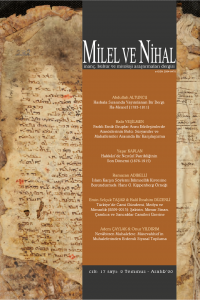From Nawabit to the Opposition: From the Opposition of the Mutevahhid to the Virtuous Political Society
Abstract
In this study, contrary to classical or modern political philosophy, which is accepted to be good, happy and competent only in a political society, Ibn Bajjah claims that the philosopher/individual can be happy and competent on his own, "self-management of the individual" ( based on the conceptualization of the rule of man alone). The possibility of transformation through the opposition of the nawabit to an unvirtuous political society will be discussed. Actually, the concept (nawabit) is negatively considered (especially in Al-Farabi) as an unvirtuous individual in a virtuous political society in the tradition of Islamic moral and political philosophy. However, the study is based on Ibn Bajjah's conceptualization of nawabit, which gives a positive meaning to the concept of "nawabit" in a degraded and distorted state. It aims to make an analysis on the praxis of how an unvirtuous political society can evolve with the opposition of the nawabit class. As a result, this study can make a theoretical contribution to the transformation of an unvirtuous state and society to the virtuous one that based on good, right, just and virtue through the analysis of the Ibn Bajjah’s approach and conceptualizations, which are thought to have an exceptional place in classical political philosophy. In this context, a new opposition approach and theory can be built. Moreover, it is thought that it may seek a door towards the construction of its strategy.
References
- Alon, Ilai. “Farabi’s Funny Flora Al-Nawabit as “Opposition”. Arabica 37/1 (1990): 56-90.
Abstract
Bu çalışmada, bireyin ancak bir siyasal toplum içinde iyi, mutlu ve yetkin olacağı kabul edilen klasik ya da modern siyaset felsefesinin aksine, filozofun/bireyin tek başına da mutlu olabileceği ve yetkinleşebileceği iddiasını di-le getiren İbn Bacce’nin “tedbirü’l-mütevahhid” (yalnız insanın yönetimi) kavramsallaştırmasından yola çıkarak, erdemsiz bir toplumda mütevahhidin (nevâbitin) muhalefetinden erdemli bir siyasal topluma dönüşümün olanağı tartışılacaktır. Buna ilaveten çalışma, Fârâbî başta olmak üzere İslam ahlak ve siyaset felsefesi geleneğinde erdemli bir siyasal toplumda erdemsiz birey olarak olumsuz nitelendirilen “nevâbit” kavramına olumlu bir anlam yükleyen İbn Bâcce’nin nevâbit kavramsallaştırmasından yola çıkarak, bozulmuş ve çarpık bir devlette, nevâbit taifesinin muhalefetiyle erdemli bir si-yasal toplumun nasıl tekevvün edebileceğinin praksisi üzerine bir analiz yapmayı amaçlamaktadır. Sonuç olarak bu çalışmanın, klasik siyaset felsefesinde istisna bir yere sahip olduğu düşünülen İbn Bâcce’ci yaklaşım ve kavramsallaştırmaların analizi üzerinden günümüzde erdemsiz devlet ve toplumunun iyi, doğru, adil ve erdeme dayanan bir dönüşümüne teorik katkı yapabileceği ve bu bağlamda yeni bir muhalefet yaklaşımı, teorisi ve stratejisinin inşasına yönelik bir kapı arayabileceği düşünülmektedir.
References
- Alon, Ilai. “Farabi’s Funny Flora Al-Nawabit as “Opposition”. Arabica 37/1 (1990): 56-90.
Details
| Primary Language | Turkish |
|---|---|
| Journal Section | Articles |
| Authors | |
| Publication Date | December 31, 2020 |
| Submission Date | August 29, 2020 |
| Published in Issue | Year 2020 Volume: 17 Issue: 2 |


